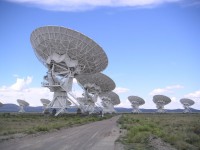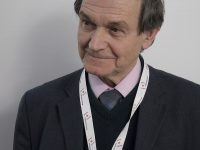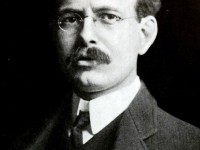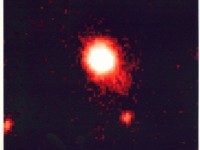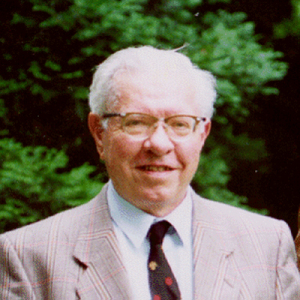
Sir Fred Hoyle FRS (1915-2001)
On August 20, 2001, famous astronomer, mathematician, and author Sir Fred Hoyle passed away. The scientist was the first to coin the term “Big Bang” for the now prevailing theory of the early development of the universe in 1949, even though he happened to be a strong opponent of this theory.
“We now come to the question of applying the observational tests to earlier theories. These theories were based on the hypothesis that all the matter in the universe was created in one big bang at a particular time in the remote past. It now turns out that… all such theories are in conflict with observational requirements.”
— Fred Hoyle at BBC radio broadcast, March 28, 1949. Reprinted in April 1949 in The Listener, a BBC magazine.
Education and World War II
Hoyle was born and grew up in England. After attending Bingley Grammar School in Bingley, West Yorkshire, Fred Hoyle first studied mathematics at Emmanuel College, University of Cambridge. In the autumn of 1940, during the Second World War, he left Cambridge to work in Portsmouth on radar research for the British admiralty, one of the methods he developed was to determine the height of incoming aircraft. Two of his colleagues in this important war project were Hermann Bondi and Thomas Gold,[4,12] with whom he often and profoundly discussed cosmology – a topic that fascinated him more and more. As part of the radar project, Hoyle was also able to travel to North America several times, which he also used to hold talks with astronomers. Already on the first of these journeys he had learned about supernovae as well as the nuclear-physical concept of plutonium implosion and discovered similarities between both phenomena, which inspired him to write a first publication on the nucleosynthesis of supernovae.
After the end of the war in 1945, Fred Hoyle returned to Cambridge University, where he first lectured at St John’s College. In the years following his time at Cambridge (1945-1973) he became one of the world’s leading astrophysicists thanks to the amazing originality of his ideas, which covered an enormous range of topics.
The Steady State Theory
Hoyle was always convinced that the universe is indeed expanding, but the density of the matter is invariable, because of the homogenous development of new matter at all times. This theory is called ‘Steady State‘ and was developed by Hoyle as well as his former colleagues Herman Bondi and Thomas Gold. This theory was often compared with a flowing river, because even though the water molecules move away from each other, the river stays the way it is. The ‘Steady State Theory’ has been proven wrong at the latest with the discovery of the cosmic microwave background radiation, which has been predicted by the scientists favoring the ‘Big Bang Theory‘. The term itself was established by Fred Hoyle himself. On BBC radio’s third programme broadcast, Hoyle hosted a show about astronomy, in which he tried to explain the difference between the two leading theories and thereby coined the term ‘Big Bang’. The content of this popular show was published in his book ‘The Nature of the Universe‘. In 1993, together with Jayant Narlikar and Geoffrey Burbidge, Hoyle proposed an extension of the steady state theory (quasi-steady state theory). In the 1960s he also developed with Narlikar a conformist extension of the general theory of relativity, which fulfilled the Mach’s principle.
Leaving Cambridge and Success as an Author
In 1967 Fred Hoyle created the Institute of Theoretical Astronomy, which later merged together with two other institutions to the Institute of Astronomy and depicts the largest astronomy department at Cambridge. After leaving Cambridge, he moved to the Lake District, County of Cumbria, where he undertook extensive hikes through nature and devoted himself primarily to his highly successful writing and non-conformist science projects, which met with harsh rejection in the scientific community almost without exception. He also wrote science fiction books and was invited to numerous talks around the globe. To his most popular books belongs the science-fiction novel ‘The Black Cloud‘ published in 1957. It discusses a huge black cloud moving towards the Earth, which causes panic. A group of scientists then tries communicating with the cloud to understand its purpose. Some scientific topics in the book are artificial intelligence, as well as optical character recognition, which gain as much importance in the novel as the problems the scientists face with the government officials.
Later Years
In his later years, together with Chandra Wickramasinghe, he also developed the theory that life in space was created and spread through the universe through panspermia, and that evolution on Earth was driven by a steady influx of viruses transported from comets to us. Hoyle also provoked controversy when he questioned the authenticity of the fossils of the Archaeopteryx (which was repeatedly confirmed by further discoveries) and condemned the failure to include Jocelyn Bell Burnell in the award of the Nobel Prize in Physics for the discovery of pulsars.[5] His contributions to biology and paleontology were rejected by the experts as amateurish.
On 24 November 1997 he crashed on a hike through the heathlands of western Yorkshire near his native Gilstead in a gorge called Shipley Glen. About twelve hours later he was discovered by a search dog. He was seriously injured and taken to a hospital, where he had to spend two months to treat his shattered shoulder and due to pneumonia and kidney problems due to hypothermia. After that, Fred Hoyle suffered from memory impairment and other mental problems. Fred Hoyle was a remarkable scientists, not fearing conflict which led to him being in many controversial positions during his career. Never accepting the Big Bang theory, Fred Hoyle passed away on August 20, 2001 at the age of 86.
“Space isn’t remote at all. It’s only an hour’s drive away if your car could go straight upwards.”
— Fred Hoyle, “Sayings of the Week”, The Observer (9 September 1979)
Fred Hoyle’s IFS Lecture December 1982, [10]
References and Further Reading:
- [1] Fred Hoyle in the Physics of the Universe
- [2] Fred Hoyle Website
- [3] Fred Hoyle in Spiegel Online (In German language)
- [4] Sir Hermann Bondi and the Steady State Theory, SciHi Blog
- [5] Jocelyn Bell Burnell and the Discovery of Pulsars, SciHi Blog
- [6] Obituary by Sir Martin Rees in Physics Today
- [7] O’Connor, John J.; Robertson, Edmund F., “Fred Hoyle”, MacTutor History of Mathematics archive, University of St Andrews.
- [8] Fred Hoyle at the Mathematics Genealogy Project
- [9] Fred Hoyle at Wikidata
- [10] Fred Hoyle’s IFS Lecture December 1982, Lecture by Sir Fred Hoyle to the Sri Lanka Institute of Fundamental Studies, December 1982, “From Virus to Cosmology, The University of Buckingham @ youtube
- [11] Georges Lemaître and the Big Bang Theory, SciHi Blog
- [12] Thomas Gold and the Steady-State Theory, SciHi Blog
- [13] Timeline for Fred Hoyle, via Wikidata

